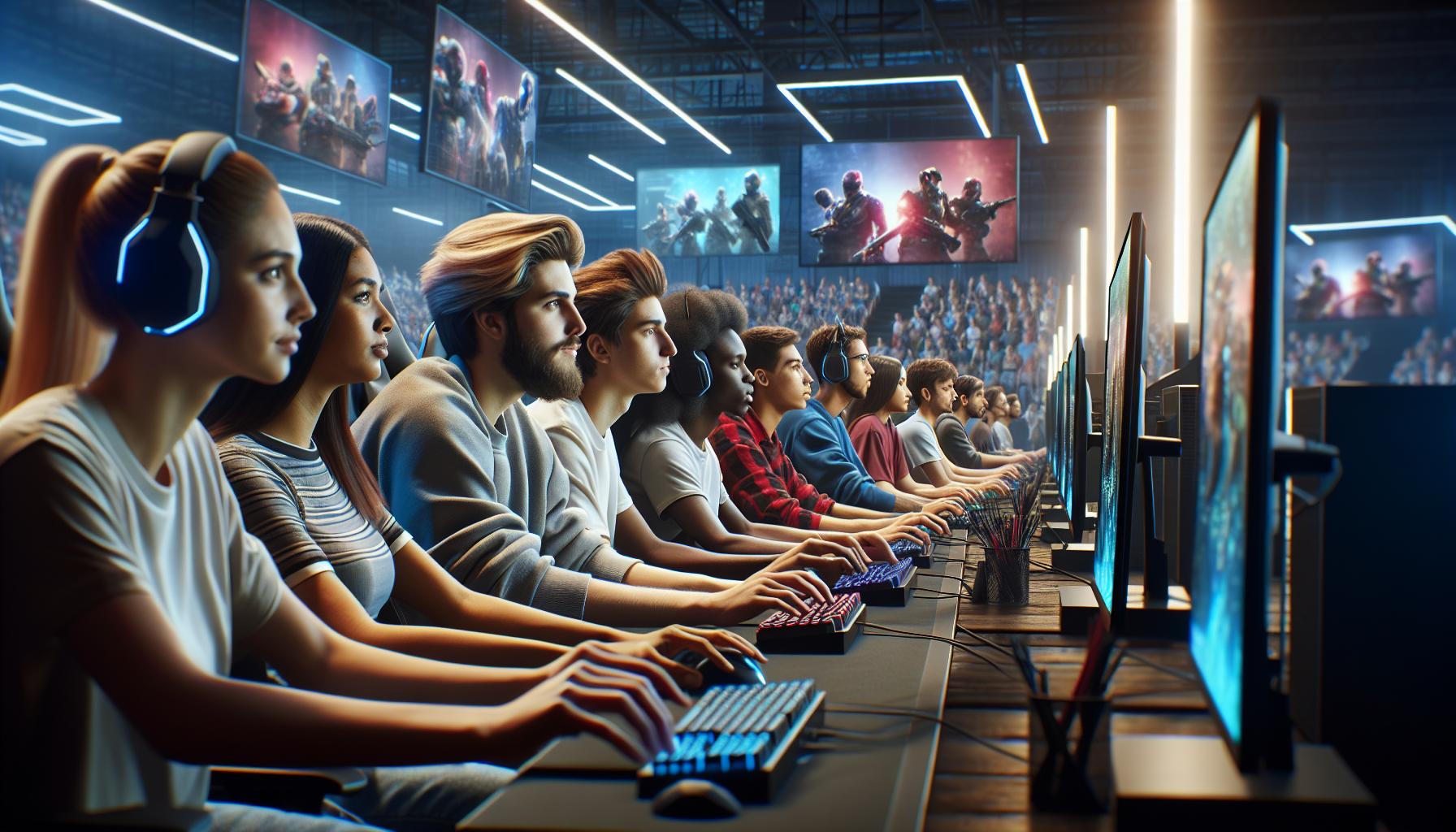Esports has exploded in popularity, and the NCAA is taking notice. As traditional sports evolve, collegiate esports is carving out its own niche, attracting players and fans alike. With competitive gaming now recognized on campuses across the country, it’s reshaping the landscape of college athletics.
I’m excited to dive into the world of NCAA esports, where strategy meets teamwork in a digital arena. From tournaments to scholarships, this burgeoning field offers unique opportunities for student-athletes. Whether you’re a seasoned gamer or just curious about this trend, understanding NCAA esports is essential in today’s sports culture. Let’s explore how this phenomenon is changing the way we view competition in higher education.
Key Takeaways
- NCAA Recognition: Esports is now officially recognized by the NCAA, providing a legitimate platform for collegiate competitive gaming and enhancing its status within college athletics.
- Scholarships and Recruitment: Many colleges and universities are offering scholarships for esports, attracting talented gamers and providing significant financial support for student-athletes.
- Community and Culture: NCAA esports fosters community engagement through events and tournaments, enhancing school spirit and promoting teamwork among students.
- Competitive Structure: The NCAA esports framework mirrors traditional sports, with established conferences and organized tournaments for popular games like League of Legends and Overwatch.
- Growth Challenges: NCAA esports faces hurdles, including institutional resistance and regulatory complexities, which need to be addressed to ensure growth and equitable opportunities.
- Financial Opportunities: Esports can generate revenue for institutions through merchandising, ticket sales, and sponsorships, contributing to the sustainability of college operations.
NCAA Esports
NCAA esports encompasses competitive video gaming among college students, fostering team-based gameplay and strategic thinking. The NCAA recognizes esports as a legitimate component of collegiate athletics, paralleling traditional sports in structure and organization. This recognition provides a platform for student-athletes to showcase their skills and engage with peers through various tournaments.
Colleges and universities across the United States are increasingly hosting esports programs. These programs offer scholarships and funding opportunities for talented players, enhancing recruitment for institutions looking to attract quality students and skilled gamers. Competitions often feature popular titles like League of Legends, Overwatch, and Rocket League, drawing significant attention from fans and potential sponsors.
Community involvement remains crucial within NCAA esports. Colleges create strong fan bases by hosting events that encourage student participation and elevate campus culture. Furthermore, partnerships with game developers and industry leaders foster growth within this new realm of competition.
The financial implications of NCAA esports are noteworthy. Institutions can generate revenue through merchandising, ticket sales for live events, and sponsorships. This revenue supports various aspects of college operations while providing resources for further development of esports programs.
Overall, NCAA esports is rapidly evolving, blending education, athletics, and entertainment. This trend redefines the landscape of competition in higher education while instilling valuable skills in student-athletes.
History of NCAA Esports

NCAA esports has evolved significantly, marking a noteworthy chapter in collegiate athletics. Its growth reflects the increasing acceptance of competitive gaming as an integral part of the college experience.
Emergence of Competitive Gaming
Competitive gaming gained traction in the early 2000s, complete with organized tournaments and a rapidly expanding fan base. Titles like StarCraft and Counter-Strike began to draw attention, creating an environment for gamers to showcase their skills. As online gaming became more accessible, participation surged. By the 2010s, titles such as League of Legends and Dota 2 further propelled esports into mainstream culture, leading to wider recognition at the collegiate level.
Initial NCAA Involvement
The NCAA began exploring esports officially around 2016. Academic institutions started forming esports clubs and teams, focusing on collaboration and competition. Though the NCAA initially refrained from governing esports like traditional sports, conversations about formal recognition intensified. In 2020, discussions led to establishing best practices and guidelines, acknowledging the need for a structured framework to support collegiate esports initiatives. This shift indicated a commitment to ensuring equitable opportunities for student-athletes participating in esports.
NCAA Esports Structure

The NCAA esports structure mimics traditional athletic frameworks, ensuring a coherent approach to organizing competitions among colleges and universities. This support fosters growth and recognition for competitive gaming within higher education.
Conferences and Member Institutions
Conferences play a crucial role in organizing NCAA esports. Major conferences like the National Association of Collegiate Esports (NACE) and the Collegiate StarLeague (CSL) include numerous member institutions. These organizations provide resources, set competition standards, and create a cohesive structure for tournaments. Member institutions actively participate in esports, establishing teams, offering scholarships, and encouraging student engagement. This collaboration among colleges aids in the standardization of rules and formats across various games, fostering a competitive yet inclusive environment.
Game Titles and Competitions
The NCAA esports landscape features popular titles like League of Legends, Overwatch, Rocket League, and Valorant. Each title attracts a dedicated player base while varying in gameplay style and competition format. Regular season matches build up to large-scale tournaments, such as the NACE National Championship. These events showcase top talent and attract significant viewership, enhancing the prestige of collegiate esports. Participation in multiple competitions allows institutions to highlight their teams’ skills and engage the community through live events, streaming, and social media.
Benefits of NCAA Esports

NCAA esports offers numerous advantages for both student-athletes and institutions. The benefits encompass student engagement, community building, and scholarship opportunities that enhance the collegiate experience.
Student Engagement and Community Building
Student engagement increases as esports programs attract diverse participants. Students from various backgrounds, interests, and skill levels join teams, fostering inclusivity. Live events, tournaments, and themed competitions draw enthusiastic fans, generating school spirit and a sense of belonging. Colleges create fan clubs and host viewing parties, enhancing community interaction and encouraging camaraderie among students. Engaging in esports promotes teamwork, communication, and leadership skills essential in both gaming and life.
Scholarship Opportunities
Scholarship opportunities abound within NCAA esports, providing financial support and recognition for student-athletes. Many colleges now offer esports scholarships, attracting talented gamers who may otherwise pursue different paths. Institutions recognize esports’ competitive nature, aligning with traditional sports in providing resources and funding. These scholarships help cover tuition, fees, and living expenses, enabling students to focus on their education and gaming skills. With institutions emphasizing academic performance alongside gaming prowess, esports scholarship programs create equitable opportunities for aspiring student-athletes.
Challenges Facing NCAA Esports
NCAA esports faces several challenges that impact its growth and acceptance across college athletics. These challenges arise from institutional resistance and regulatory compliance issues that require attention.
Institutional Resistance
Institutional resistance to NCAA esports stems from traditional views held by academic leaders. Many colleges and universities prioritize conventional sports, viewing esports as less credible. Some administrators worry about the perceived risks associated with gaming, such as addiction and academic underperformance. Certain schools hesitate to invest in esports programs due to concerns about funding allocation and resource distribution. This reluctance can limit participation opportunities for student-athletes and stall the establishment of fully supported esports teams.
Regulatory and Compliance Issues
Regulatory and compliance issues present further challenges for NCAA esports. The lack of established guidelines specific to esports creates confusion about eligibility and recruitment standards. Schools must navigate various regulations concerning scholarships and academic performance metrics, which differ from those applied to traditional sports. Additionally, intellectual property rights and licensing agreements with game developers require investigation to ensure compliance, often complicating partnerships and sponsorships. This regulatory ambiguity hinders the systematic growth of esports programs and can create uneven playing fields among institutions, potentially affecting competition integrity.
Evolution in Collegiate Athletics
The rise of NCAA esports marks an exciting evolution in collegiate athletics. It’s not just about gaming; it’s about building communities and fostering teamwork among students. With the increasing recognition of esports programs across universities, I’m thrilled to see how this will shape the future of student engagement and academic opportunities.
As colleges embrace esports, they’re not only enhancing their athletic offerings but also creating pathways for diverse talent. The potential for scholarships and tournaments adds an extra layer of excitement for aspiring player-athletes. While challenges remain, the momentum behind NCAA esports is undeniable. I can’t wait to see where this journey takes us next.